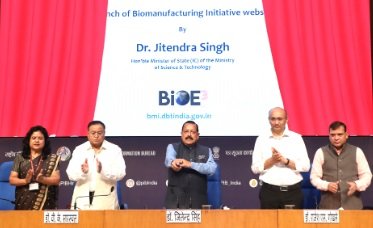
India has taken a significant step towards sustainability with the launch of its new BioE3 policy, a government initiative designed to revolutionize industrial practices through the use of biotechnology. The policy aims to harness cutting-edge biotechnological advancements to reduce waste, enhance eco-friendly production, and position India as a global leader in sustainable biomanufacturing.
What is Biotechnology?
Biotechnology involves using living organisms or biological systems to develop innovative products and solutions. It encompasses a wide range of fields, including:
- Genomics: The study of genes and their functions.
- Genetic Engineering: Altering the DNA of organisms to improve traits or create new ones.
- Synthetic Biology: Designing and constructing new biological systems or organisms that do not exist in nature.
Traditionally, biotechnology has been extensively used in medicine—such as in vaccine development—and in agriculture, where it has led to the creation of disease-resistant crops. However, the field’s potential has expanded, now playing a crucial role in areas such as environmental sustainability, bio-based manufacturing, and more.
The Potential of Biotechnology for Sustainability
Biotechnology offers the promise of a cleaner, greener future by creating products and solutions that are both innovative and eco-friendly. Some key applications include:
- Animal-Free Dairy: Through precision fermentation, scientists can replicate the proteins found in milk, creating dairy products without the need for cows. This reduces the environmental footprint associated with livestock farming.
- Bioplastics: Unlike conventional plastics derived from fossil fuels, bioplastics are made from renewable resources such as plants. These plastics are biodegradable, reducing long-term environmental damage.
- Carbon Capture: Biotechnology can help mitigate climate change by using microorganisms to convert harmful carbon dioxide (CO2) emissions into useful products like biofuels, cutting the need for underground carbon storage.
- Synthetic Biology: This emerging field enables the creation of engineered organisms that can perform specialized tasks, such as producing life-saving medicines, generating renewable energy, or even growing human organs for transplants.
Benefits of the BioE3 Policy for India
The BioE3 policy is designed to unlock the full potential of biotechnology, enabling India to become a leader in biomanufacturing—a sector projected to be worth $2-4 trillion globally within the next decade. The policy focuses on:
- Training and Education: It aims to develop a skilled workforce capable of driving the biotechnological revolution forward.
- Research and Innovation: The policy will support research initiatives that leverage India’s scientific talent to pioneer new bio-based solutions.
- Economic Growth: By fostering innovation, the policy is set to boost India’s economy, attracting investments and creating job opportunities in sustainable industries.
Implementation Framework
A key feature of the BioE3 policy is the creation of biomanufacturing hubs across the country. These hubs will serve as innovation centers, where startups and established industries can collaborate to develop bio-based products. The hubs will focus on a range of sectors, including:
- Bio-based Chemicals and Enzymes: Derived from biological sources, these products can replace harmful synthetic chemicals in industries such as manufacturing and pharmaceuticals.
- Functional Foods and Smart Proteins: These healthier, sustainable alternatives to traditional food products are designed to improve public health while minimizing environmental impact.
- Precision Biotherapeutics: Tailored medical treatments that leverage biotechnology to provide personalized healthcare solutions.
- Climate-Resilient Agriculture: Biotechnology will help develop crops that can withstand extreme weather conditions, ensuring food security in the face of climate change.
- Carbon Capture and Utilization: Advanced technologies will be implemented to reduce carbon emissions and convert CO2 into useful products.
- Marine and Space Research: The policy will also explore the potential of biotechnology in deep-sea and space environments, opening new frontiers for scientific discovery.
Collaborative Effort
To ensure the success of the BioE3 policy, collaboration between at least 15 government departments will be required. This multi-departmental approach will facilitate the seamless integration of biotechnology across various sectors of the economy. It is expected to accelerate the development and deployment of sustainable technologies, making the BioE3 policy a national effort in driving India’s sustainable future.
Summing Up
India’s BioE3 policy is a groundbreaking initiative that holds the potential to reshape the country’s industrial landscape through sustainable biotechnology. By focusing on eco-friendly practices, biomanufacturing, and global collaboration, the policy positions India as a leader in the bioeconomy, promoting innovation that is not only economically beneficial but also essential for addressing pressing environmental challenges. As biotechnology continues to advance, the BioE3 policy will play a critical role in ensuring that India remains at the forefront of sustainable development.

